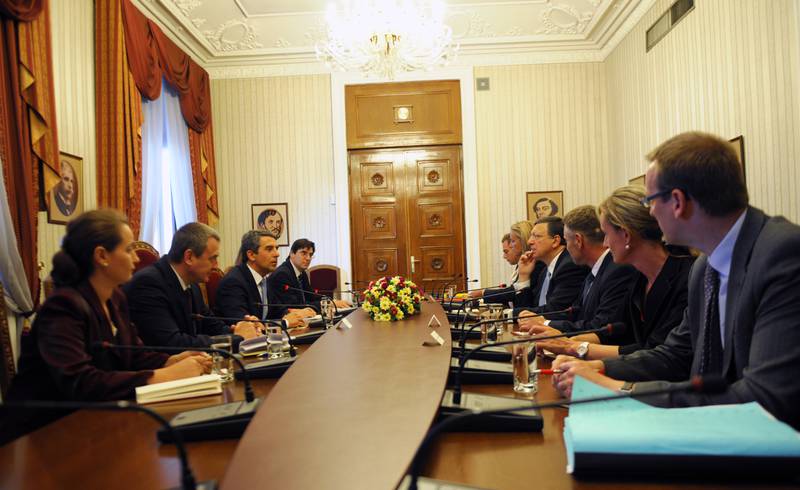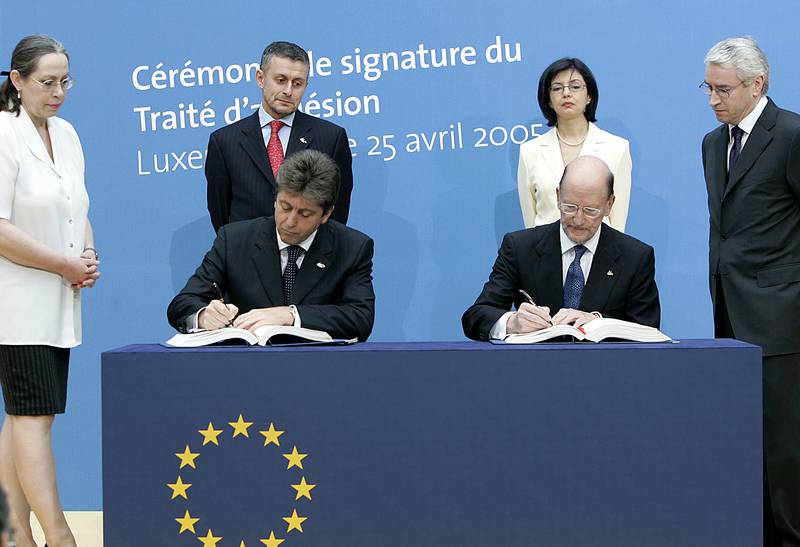Commission: There Is No Political Consensus for Reforms in Bulgaria
Adelina Marini, January 22, 2014
 The report from July 2012 was meant to be the summary of the entire period of functioning of the Cooperation and Verification Mechanism (CVM) which enabled Bulgaria to become a member of the EU on January 1st 2007. But it so happened that the most summarising report is that of January 22 2014 because it provides the most complete picture of the work of the Bulgarian authorities under the Mechanism. Because, yes, the main part of the work was expected to be done by the Bulgarian authorities and the Commission was only to monitor their progress in six benchmarks. The main conclusions in the long-awaited document are doubts in the independence of the judiciary and all newly established bodies, doubts in the separation of powers, doubts in the integrity of the undertaken measures. And although the European Commission spokesman underlined many times that the report was not a political assessment for neither government, it clearly shows that it is.
The report from July 2012 was meant to be the summary of the entire period of functioning of the Cooperation and Verification Mechanism (CVM) which enabled Bulgaria to become a member of the EU on January 1st 2007. But it so happened that the most summarising report is that of January 22 2014 because it provides the most complete picture of the work of the Bulgarian authorities under the Mechanism. Because, yes, the main part of the work was expected to be done by the Bulgarian authorities and the Commission was only to monitor their progress in six benchmarks. The main conclusions in the long-awaited document are doubts in the independence of the judiciary and all newly established bodies, doubts in the separation of powers, doubts in the integrity of the undertaken measures. And although the European Commission spokesman underlined many times that the report was not a political assessment for neither government, it clearly shows that it is.
The reporting period covers 18 months or in the Bulgarian case three governments, which clearly exposed the political influence on key appointments: "[...] a period during which Bulgaria has had three different governments – have been the source of concern rather than reassurance, with appointments having to be aborted due to integrity issues, the escape from justice of convicted leaders of organised crime and a succession of revelations about political influence on the judicial system". And although one of the most visible criticisms is the lack of transparency in the decision-making process of the governing parties, it becomes very clear in the report that for the Commission the political behind-the-scenes is quite transparent and its intentions did not remain unseen.
The report, indeed, contains everything from the past 18 months that marked the disgrace of the Bulgarian state and statehood and fuelled the feeling of a return of totalitarianism and authoritarianism. And the main conclusion is that throughout the reporting period and in spite of the different governments no consensus was built among the political elite about the needed reforms. This is probably the clearest message that is the closest to a political evaluation of the work of the governments in question, because, practically, it says that neither of them had not had a goal neither to work on the benchmarks in the CVM nor to do any reforms.
Significant political interference in the judiciary
The existence of an independent from political influence judiciary is crucial for the establishment of solid statehood and democracy with a long expiration period. And precisely here Bulgaria has been failing for seven years in a row in interrupting the corrupting link between politics and judiciary. The Supreme Judicial Council (SJC) was the European Commission's hope that it will drive the reform of the judicial system. The election of members of SJC from the parliamentary quota in the autumn of 2012, however, in spite of the attempts to make it more transparent, suggests "significant party political influence". The election from the judicial quote did not contribute to increasing the confidence in that institution as well. The main conclusion in the report, in terms of SJC, is that the institution has failed to make integrity a number one priority. "The result is that the SJC is today not widely regarded as an autonomous and independent authority able to effectively defend the judiciary's independence vis-à-vis the executive and parliamentary branches of government".
That conclusion of the Commission, though, has its roots very clearly described in the July 2012 report: "Constitutional amendments of February 2007 set the framework for judicial independence in Bulgaria. The Constitution gives the judicial system considerable managerial autonomy. However, it also gives a strong role to political institutions - half the elected members of the Supreme Judicial Council (SJC), and all judicial inspectors, are elected by Parliament – a source of criticism by the Venice Commission of the Council of Europe. Lay judges can have a decisive influence on decisions in court, but are nominated by local political forces. [...] The overall impression is of a failure to respect the separation of the powers of the state which has direct consequences for public confidence in the judiciary". 18 months later, in the Commission report, these direct consequences can clearly be seen. They are most evident in the technical part of the document. And as a matter of fact, the constitutional amendments are the first benchmark of all the six in the CVM. Seven years later, it becomes clear that benchmark number one has been implemented in the wrong way.
And one more distressful conclusion in the report: "The onus for defending the independence of the judiciary, or for scrutinising whether politically-sensitive cases are handled objectively, often seems to fall on civil society", which means that the system itself is incapable of handling its own self. The SJC has always been the central institution with high expectations by the Commission to conduct the reform of the judicial system. In this sense, it is important to note that the report does contain a direct message to the minister of justice, Ms Zinaida Zlatanova, who repeated many times last year that the reform should be done by the magistrates themselves. The Commission responds that "As well as the SJC, the other key player in setting a tone of reform for the judicial system is the Ministry of Justice".
The Peevski scandal
The report pays sufficient attention on the scandal provoked by the appointment of Delyan Peevski to head the powerful State Agency for National Security (SANS) which unleashed massive and continuous protests last June. The text is not simply a reporting on the case, but rather some quite clear messages can be read and felt in it. It is explicitly stated that key appointments on public positions are decided in an nontransparent way (we call this behind-the-scenes way), which translated from the Brussels language means "under influence of the oligarchy". And if the Bulgarian government is daring to read the report as a praise, it should know that the document will not be read in the same way by the Council or the Europarliament. When next time the issue of Bulgaria's readiness for membership in the security zone Schengen is discussed, then many parliaments in the member states and media will read that particular sentence like this: the oligarchy takes part in the appointments of people on key state positions. And this has already happened. The British ambassador in Sofia wrote on Twitter that the report is depressing and that Bulgaria is making small steps forward and big steps back.
 Beside SANS, the report mentions also the election of judges to the Constitutional court. It is also said that although the nominations were withdrawn "both left a legacy of concern about how the system runs". And this is another direct slap for the rulers who claimed that they had learnt the lessons and had admitted Peevski's appointment a mistake. However, they failed to mention anything about what will they do to prevent the Peevski model to happen again neither in SANS, nor in the Constitutional court or elsewhere on key positions for the statehood.
Beside SANS, the report mentions also the election of judges to the Constitutional court. It is also said that although the nominations were withdrawn "both left a legacy of concern about how the system runs". And this is another direct slap for the rulers who claimed that they had learnt the lessons and had admitted Peevski's appointment a mistake. However, they failed to mention anything about what will they do to prevent the Peevski model to happen again neither in SANS, nor in the Constitutional court or elsewhere on key positions for the statehood.
The situation with the appointments in the judicial inspectorate is also depressing. "Delays have given the impression that the key factor is an inability to agree on a candidate in advance, whilst this kind of position should be filled following an open process designed to appoint a highly skilled professional who can show and apply full objectivity". The recent champion and the only praised in previous CVM reports inspectorate received valuable pieces of advice that reveal the complete lack of realisation what its fundamental function is. It is expected not only to focus on statistics, but also to analyse the quality of cases. Apart from that it is mentioned that the inspectorate failed to include in its inspections the criteria of integrity and ethical behaviour of magistrates.
The report also notes the end of the "Tsvetanov" era in the ministry of interior. It is in this particular area that the Commission does not save words and reports "significant reforms to focus on its core purpose of law enforcement". It is noted that the "problematic" practise with donations has been stopped - a practise by the presvious government - but there is criticism that the ministry did not handle in an appropriate way the demonstrations and the migration pressure along the borders, which is aimed at the current government.
A complete failure in the fight against corruption
The report notes that many institutional changes have been done in the past years but neither of them had not led to visible results. Heavily criticised is the anti-corruption agency BORKOR which was broadly promoted as a key instrument in identifying and addressing corruption risks. The Commission has detected a major flaw in the fight against corruption, which euinside wrote about on the occasion of the opening of chapters 23 and 24 in the negotiations process with Montenegro, namely that the fight against corruption is diffuse. There is no single body that has the power and autonomy to conduct this fight. In this area is one of the clearest recommendations in this year's report: "Entrust a single institution with the task to coordinate the fight against corruption, to assist and coordinate the efforts in different sectors".
And as Kristian Vigenin, the foreign minister, has been preparing a strike back against the report demanding all member states to be monitored because they all have imperfections, the report refutes him clearly and proves the need of a continuation of the monitoring especially of Bulgaria. Let us not forget, in this regard, that Bulgaria made a commitment to its EU partners and its citizens that the price for its accession on January 1st 2007 would be continuation of the efforts in the fight against corruption, especially on high levels, and organised crime. That commitment was made by the bearer of the mandate of the current government, then a prime minister and now a leader of the Party of European Socialists. The results seven years later are that "Bulgaria is considered to have one of the highest corruption risks among EU Member States. As noted in the Commission's 2012 CVM report, the level of concern about corruption in Bulgaria is considerable, with 95% of Bulgarians defining corruption as a major problem".
The report quotes also the analysis of the Bulgarian prosecution which reveals that corruption cases involving high level officials are opened sporadically and usually only after the minister in question or the government is dismissed. Statistics shows that currently four cases are ongoing against former ministers, one related to illegal wiretapping by officials in the ministry of the interior. Announced is an investigation of a high official from the ministry of interior for bribe but there is no indictment yet. Only one member of Parliament is charged with money laundering and the case against another for trade of influence was delayed many times, the report from Brussels says. No convictions or as Brussels loves to say - no track-record. The report does not miss to mention that political changes in Bulgaria, generally,  lead to broad changes at administrative level which has a negative impact on the fight against corruption.
lead to broad changes at administrative level which has a negative impact on the fight against corruption.
The issue of organised crime is in the very same condition, as the report makes a very strong connection between corruption and organised crime. Many cases of high public interest are suspended, there are no convictions in serious cases of killings after long years of investigation. It is specifically noted, again, that high level figures from the underworld succeed to escape justice on the eve of the final conviction. The European Commission's greatest concern, though, is that "nobody was willing to take responsibility for this, and that no steps have been taken to guarantee that this could not happen again, is an even stronger reflection on the difficulties of the system to address the problems". A clearer message that the political class works on behalf of the organised crime could have hardly been expected.
There is another more resonant slap in the text. And it is that the Bulgarian authorities work more on the details missing out the big picture. It is made in the part of the text that mentions the work on a new penal code. Not only does it criticise the way the draft was made, mainly without broad public debate and without participation of the non-governmental sector, but the report notes that it is important the new penal code to have an overall vision and to explain how exactly will it improve the fight against corruption and organised crime and how will it secure a smooth link between the management of the judiciary and law-enforcement. The Commission even recommends amendments to the penal procedural code. The slap echoes in another place in the test where independent experts are quoted saying that the organised crime in Bulgaria is already investing in the legal economy. "Strategies focusing on 'traditional' criminal activities and on a widespread number of isolated individual cases of petty or medium-level corruption therefore risk missing a dimension of growing importance. Corruption as an enabling factor for organised crime is also considered to be of particular importance in an effective response to organised crime", the document says.
Protests get formal support
Although the Commission does not discuss specifically the protests, it points out in the report that in Bulgaria there are voices who demand reform and who are frustrated with the slow change. These voices "deserve encouragement", the text says and calls on the Bulgarian authorities to work with these voices.
I was very critical for quite some time about the Commission's decision the reporting period to be extended from six months to a year and in this particular case 18 months because I believed this was sparing the trouble for certain governments. Now I agree with what Mark Gray said that the longer period of reporting provides a better perspective of the overall picture. Moreover, with the shorter reporting period there was a temptation of short-termism by the Bulgarian authorities which, translated, means  doing only what could deserve a praise in the report that can be used to crush a political opponent at home.
doing only what could deserve a praise in the report that can be used to crush a political opponent at home.
Generally, the document, for the first time since the establishment of the mechanism, is very blunt, precise and shows the Commission has definitely given up the carrot. The only thing I miss is the independence of media. The Commission made a precedent last year with Romania by including the problem with the media environment in that country in the report from January last year. Before journalists, spokesman Mark Gray noted that slight reduction of pressure on media is detected in the past year, but vigilance should be maintained. It is evident that no matter how fragile the results in this area are, the Commission's criticism delivers. That is why it is completely puzzling why the Commission is saving criticism in Bulgaria given that the responsible for media commissioner Neelie Kroes herself witnessed the huge problem with the media environment in the country during her meeting with publishers, independent journalists and bloggers in the autumn of 2012 in Sofia.
The media monopoly and distortion of facts does not give the citizens a possibility to take informed and objective decisions who is to blame that their country has not moved not even a step forward since its accession to the EU and also that there is a direct link between the level of corruption and organised crime and the level of poverty of the majority of citizens. In the very report, it is mentioned that there are "clear consequences for the desire of business to invest in Bulgaria". Media are a natural correction of power. But when they are forced to serve the government, then we are talking about totalitarianism. This is precisely what the Commission has either missed to report or has decided to skip because it would look ugly, while criticising Ukraine, to have in your own yard a country whose governance has a serious totalitarian appetite. That is why, may be, it is high time the European Parliament, after the elections of course, to invite the Bulgarian prime minister to lay out both his vision on the future of Europe and about the reform of Bulgaria.
 Entrance to the Berlaymont building | © EC - Audiovisual Service
Entrance to the Berlaymont building | © EC - Audiovisual Service | © European Union 2020, EC - Audiovisual Service
| © European Union 2020, EC - Audiovisual Service Commission President Ursula von der Leyen | © European Union 2019 - Source: EP
Commission President Ursula von der Leyen | © European Union 2019 - Source: EP